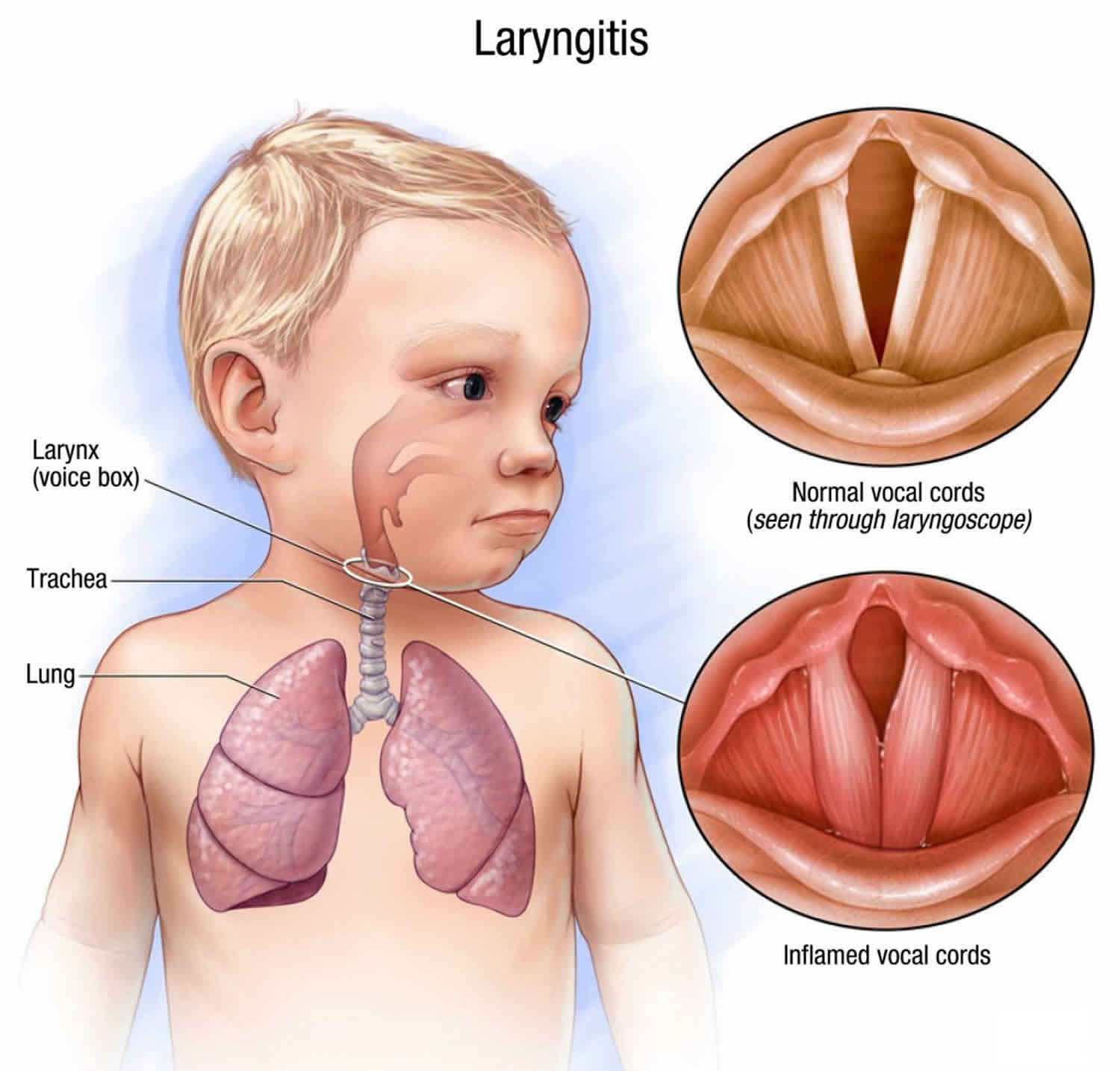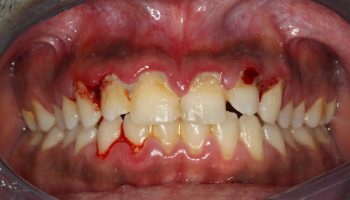Acute laryngitis
Acute laryngitis occurs when your voice box (larynx) becomes inflamed from overuse, irritation or infection and your vocal cords become swollen and can’t vibrate properly. This causes you to sound hoarse or to lose your voice. Normally you will recover from acute laryngitis without treatment.
Inside the larynx are your vocal cords — two folds of mucous membrane covering muscle and cartilage. Normally, your vocal cords open and close smoothly, forming sounds through their movement and vibration.
But with acute laryngitis, your vocal cords become inflamed or irritated. This swelling causes distortion of the sounds produced by air passing over them. As a result, your voice sounds hoarse. In some cases of laryngitis, your voice can become almost undetectable.
Laryngitis may be short-lived (acute) or chronic (laryngitis for more than 3 weeks). Most cases of laryngitis are triggered by a temporary viral infection or vocal strain and aren’t serious. Persistent hoarseness can sometimes signal a more serious underlying medical condition.
You can manage most acute cases of laryngitis with self-care steps, such as resting your voice and drinking plenty of fluids. Strenuous use of your voice during an episode of acute laryngitis can damage your vocal cords.
Make an appointment with a doctor if your laryngitis symptoms last more than two weeks.
Seek immediate medical attention if you:
- Have trouble breathing
- Cough up blood
- Have a fever that won’t go away
- Have increasing pain
- Have trouble swallowing
Seek immediate medical attention if your child:
- Makes noisy, high-pitched breathing sounds when inhaling (stridor)
- Drools more than usual
- Has trouble swallowing
- Has difficulty breathing
- Has a fever higher than 103 °F (39.4 °C)
These signs and symptoms may indicate croup — inflammation of the larynx and the airway just beneath it. Although croup can usually be treated at home, severe symptoms require medical attention. These symptoms can also indicate epiglottitis, an inflammation of the tissue that acts as a lid (epiglottis) to cover the windpipe (trachea), which can be life-threatening for children and adults.
Acute laryngitis causes
The cause of acute laryngitis includes vocal misuse, exposure to noxious agents or infectious agents leading to upper respiratory tract infections. The infectious agents are most often viral infections similar to those that cause a cold but sometimes bacterial.
Rarely, laryngeal inflammation results from an autoimmune condition such as rheumatoid arthritis, relapsing polychondritis, granulomatosis with polyangiitis (formerly called Wegener’s granulomatosis) or sarcoidosis. A case report showed a 2-year-old intubated patient who was given activated charcoal for poisoning, resulting in obstructive laryngitis. This unusual case demonstrates the myriad potential causes of acute laryngitis.
Risk factors for acute laryngitis
Risk factors for laryngitis include:
- Having a respiratory infection, such as a cold, bronchitis or sinusitis
- Exposure to irritating substances, such as cigarette smoke, excessive alcohol intake, stomach acid or workplace chemicals
- Overusing your voice, by speaking too much, speaking too loudly, shouting or singing.
Acute laryngitis prevention
To prevent dryness or irritation to your vocal cords:
- Don’t smoke, and avoid secondhand smoke. Smoke dries your throat and irritates your vocal cords.
- Limit alcohol and caffeine. These cause you to lose total body water.
- Drink plenty of water. Fluids help keep the mucus in your throat thin and easy to clear.
- Avoid eating spicy foods. Spicy foods can cause stomach acid to move into the throat or esophagus, causing heartburn or gastroesophageal reflux disease (GERD).
- Include whole grains, fruits and vegetables in your diet. These foods contain vitamins A, E and C, and help keep the mucous membranes that line the throat healthy.
- Avoid clearing your throat. This does more harm than good, because it causes an abnormal vibration of your vocal cords and can increase swelling. Clearing your throat also causes your throat to secrete more mucus and feel more irritated, making you want to clear your throat again.
- Avoid upper respiratory infections. Wash your hands often, and avoid contact with people who have upper respiratory infections such as colds.
Acute laryngitis symptoms
Acute laryngitis signs and symptoms can include:
- Hoarse voice
- Weak voice or voice loss
- Tickling sensation and rawness of your throat
- Sore throat
- Dry throat
- Dry cough
- Painful swallowing
- Fever
- Headache
- Runny nose
In some cases of laryngitis caused by infection, the infection may spread to other parts of the respiratory tract.
Acute laryngitis diagnosis
No laboratory studies are necessary in acute laryngitis. If the patient has an exudate in the oropharynx or overlying the vocal folds, a culture may be taken.
Direct fiberoptic or indirect laryngoscopy may be performed to provide a view of the larynx. This examination reveals redness and small dilated vasculature on the inflamed vocal folds.
Analysis of vocal fold movement reveals asymmetry and aperiodicity with reduced mucosal waves and incomplete vibratory closure. The propagation of the mucosal wave is also reduced.
Acute laryngitis treatment
Acute laryngitis often gets better on its own within a week or so. Self-care measures also can help improve symptoms.
- Rest your voice as much as you can and avoiding shouting. When you have to talk, speak softly but don’t whisper.
- Avoid whispering. Whispering irritates your larynx more than speaking softly.
- Don’t talk on the telephone or speak loudly unless you have to.
- Try not to clear your throat. If you have a dry cough, a non-prescription cough suppressant may help.
- Add moisture to the air in your home with a humidifier or vaporizer.
- Drink plenty of water and avoiding alcohol.
- Don’t smoke. And stay away from other people’s smoke.
- Gargling with warm, salty water or sucking a lozenge
- Inhale steam to help a blocked nose
- Avoid nasal decongestants (these make your throat drier).
- Use saline (saltwater) nasal washes to help keep your nasal passages open and wash out mucus and bacteria. You can buy saline nose drops at a grocery store or drugstore. Or, you can make your own at home by mixing ½ teaspoon salt, 1 cup water (at room temperature), and ½ teaspoon baking soda. If you make your own, fill a bulb syringe with the solution, insert the tip into your nostril, and squeeze gently. Blow your nose.
If your symptoms haven’t improved after 2 weeks, see your doctor as you may need medicine.
Medications used in some cases include:
- Antibiotics. In almost all cases of laryngitis, an antibiotic won’t do any good because the cause is usually viral. But if you have a bacterial infection, your doctor may recommend an antibiotic.
- Corticosteroids. Sometimes, corticosteroids can help reduce vocal cord inflammation. However, this treatment is used only when there’s an urgent need to treat laryngitis — for example, when you need to use your voice to sing or give a speech or oral presentation, or in some cases when a toddler has laryngitis associated with croup.





